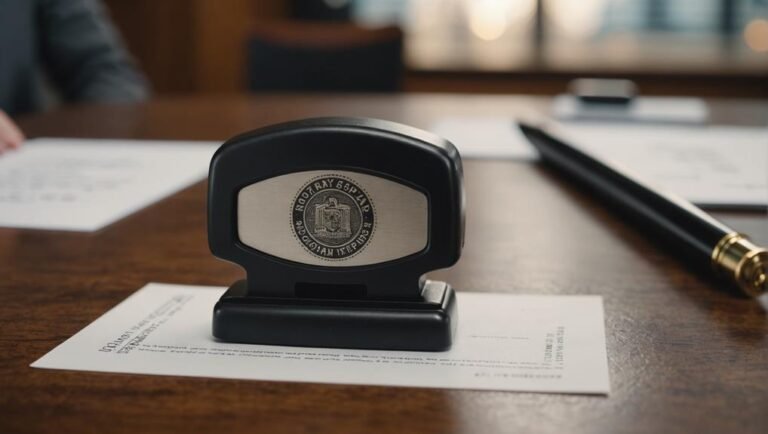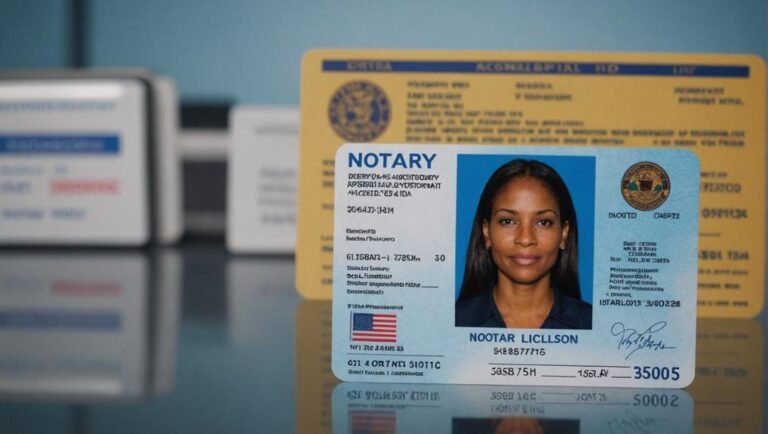Yes, in Florida, you can notarize remotely if you meet specific requirements and follow state procedures. Make sure you have an existing commission, complete the Remote Online Notary training, and obtain the necessary technology. Third-party vendors are available for technology needs. Once you've completed the RON process and have all prerequisites, you can handle remote notarizations within the state. For further details on eligibility, application, and technology requirements, refer to the guidelines outlined by the Florida Department of State.
Key Takeaways
- Existing Florida notaries can notarize remotely.
- Completion of a mandatory online education course is required.
- Use compliant technology and vendors for remote notarizations.
- Secure a certificate for remote online notarization.
- Ensure adherence to Chapter 117 of Florida Statutes.
Eligibility and Registration Requirements
To become a remote online notary in Florida, existing Florida notary publics, civil-law notaries, or commissioners of deeds must meet specific eligibility and registration requirements. This includes completing an online education training course and obtaining a certificate specifically for remote online notarization.
Additionally, before applying for remote online notary status, it's vital to contract with third-party vendors to secure the necessary technology required for remote online notarization. Understanding and reviewing the applicable statutes and rules governing remote online notarization in Florida is essential before submitting your application.
The registration process for becoming a remote online notary in Florida is facilitated through the Department of State's Division of Corporations. By ensuring that you meet all the eligibility requirements and thoroughly understand the registration process, you can successfully shift into offering remote online notarization services in the state of Florida.
Online Notary Public Application Process
Before proceeding with the online notary public application process in Florida, confirm that your current notary public status is verified.
To smoothly navigate through the application process, consider the following steps:
- Complete an online education training course and submit the certificate along with your application.
- Contract with third-party vendors for the necessary technology and review the applicable statutes to guarantee compliance.
- Submit your application through the Department of State's Division of Corporations for processing.
- Remember that your online notary public registration will run concurrently with your existing notary public commission.
Technology and Vendor Requirements
What're the key technological and vendor requirements for conducting remote online notarizations in Florida?
To conduct remote online notarizations in Florida, it's essential to verify that the technology used complies with state regulations. Vendors providing technology for electronic notarizations must adhere to the guidelines set forth in Chapter 117 of the Florida Statutes.
Essential technology requirements include tools for identity proofing and credential analysis to confirm the identity of signers. Additionally, recording technology must be in place to securely store video and audio recordings of the notarization sessions.
While the Department of State doesn't endorse specific vendors for online notarizations, it's vital to choose a vendor that meets the state's vendor compliance standards.
Expiration and Renewal
The Florida online notary public commission ends along with the notary public commission. It's crucial to monitor these dates to guarantee smooth renewal and continuation of your notary services.
Here are some key points to consider regarding the expiration and renewal of your online notary public commission:
- The online notary public registration runs simultaneously with the existing commission.
- Registration expires on the same day as the notary public commission.
- Reapplication is necessary if you plan to continue as a notary public.
- When renewing, make sure to provide accurate information regarding your current notary public commission dates in the application.
- Keeping your registration up to date is essential for maintaining your status as a Florida notary and being able to notarize documents, including remotely.
Requirements and Process for Becoming a Remote Online Notary
To become a remote online notary in Florida, you must possess an existing commission as a traditional notary, civil law notary, or commissioner of deeds. Additionally, you need to be at least 18 years old, a legal resident of Florida, and have a clean criminal record.
One pivotal step in this process is completing a two-hour Remote Online Notary (RON) training course from an approved provider. After finishing the training, you must attach the certificate of completion to your online notary application.
In addition, as a Florida online notary, you're required to have an electronic seal, electronic journal, and a digital certificate with your electronic signature to conduct notarizations. By meeting these requirements and following the necessary steps, you can become a remote online notary in Florida.
Various RON service providers can assist you in obtaining the essential tools and knowledge needed for your online notary duties.
Tools, Technology, and Service Providers
Utilize essential tools such as a computer, webcam, microphone, and secure internet connection when notarizing remotely in Florida.
To ensure a smooth remote online notarization process, consider the following:
- Use a computer that supports two-way audio and visual communication for online notarizations.
- Select a reputable Remote Online Notarization (RON) service provider that complies with Florida law.
- Opt for trusted RON service providers like BlueNotary, Cyberize It, or DocuSign for your online notarization needs.
- Maintain an electronic seal, electronic journal, and digital certificate with your electronic signature for remote online notarizations.
- Keep your software updated to guarantee adherence to current online notarization regulations.
Surety Bond and E&O Insurance Requirements
Fulfilling the guarantee bond and E&O insurance requirements is essential for aspiring remote Online Notaries in Florida. Florida mandates that Online Notaries must obtain a $25,000 guarantee bond and maintain at least a $25,000 E&O insurance policy. These requirements serve to protect the public and safeguard the integrity of the notarization process.
When applying to become a remote Online Notary in Florida, you must provide proof of obtaining both the guarantee bond and E&O insurance policy. The $25,000 guarantee bond acts as a financial guarantee that you'll fulfill your notarial duties ethically and lawfully. Similarly, the E&O insurance policy provides coverage in case errors or omissions occur during the notarization process.
Remote Online Notarization (RON) Process in Florida
When conducting Remote Online Notarization (RON) in Florida, notaries are empowered to perform notarizations for signers located anywhere in the world. To understand the Remote Online Notarization (RON) process in Florida better, consider the following:
- Notaries verify signer identity through personal knowledge or government-issued ID.
- Signers appear before the notary via audio-video technology for the notarization.
- Notaries attach electronic seals and digital certificates after completing the notarization.
- The Electronic Legal Documents law in Florida took effect on January 1, 2020, enabling RON processes.
- RON in Florida allows notaries to perform remote notarizations for signers worldwide.
Frequently Asked Questions
Does Florida Allow Remote Online Notarization?
Yes, Florida allows remote online notarization. You can use remote notary technology to meet legal requirements. Identity proofing is done through state-approved RON service providers. Witness signatures can be obtained remotely.
How Much Can You Charge for Remote Notary in Florida?
When providing remote notary services in Florida, you can charge up to $25 per session. It's a fair price that aligns with state regulations. This pricing strategy fosters trust and efficiency in your notarization process.
Can a Florida Notary Notarize a Document in Another State?
When performing notarizations in another state, consider notary jurisdiction, out-of-state requirements, and remote notary regulations for interstate document notarization. Confirm compliance with the laws of the state where the document is being notarized.
How Much Do Remote Notaries Make in Florida?
When you're curious about how much remote notaries make in Florida, consider the income potential based on the number of notarizations. Remote notaries can earn up to $25 per notarization, and the demand influences earnings.
Conclusion
To sum up, becoming a remote online notary in Florida is like discovering a hidden treasure trove of opportunities.
By meeting the eligibility requirements, utilizing the necessary technology, and following the proper procedures, you can set off on a journey to provide secure and convenient notarization services from anywhere.
Embrace the evolution of notarization with remote online notarization and unlock the door to a world of possibilities.






